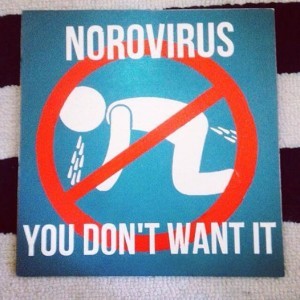There’s for sure some norovirus in the Jaykus/NoroCORE lab, but NC State Student Health Center has a message on their website suggesting that there may be be some community illnesses as well. It’s even got it’s own Twitter handle, @WolfPackNoro.
The stomach bug or stomach flu (norovirus -ben), is on campus.
If you are experiencing these symptoms call 919-515-7107.
The virus is spread by touching contaminated surfaces or objects and then touching your mouth, eating contaminated foods or drinks, and direct contact with stool or vomit while caring for a sick person. If you become sick, take care of yourself with:
▪Medications. This may include fever reducing, anti-nausea, and/or anti-diarrhea medicines.
▪Oral Rehydration. Sip only clear non caffeinated liquids, such as ginger ale, water, ice chips, sport drinks, broth soups.
▪Diet. Once liquids are tolerated eat a bland diet. This would include crackers, noodles, rice, and toast, and limit dairy. Advance your diet as tolerated.
▪IV Fluids, as needed. Prevention is key to staying well.
Washing hands is the most important thing to do to prevent getting or spreading the infection. Also, decontaminate surfaces and objects, such a computer keyboards, door handles, and steering wheels.
I’d add that alcohol-based hand sanitizer, a favorite tool in outbreaks, isn’t effective against human norovirus unless it’s (VF481) and to decontaminate with chlorine-based compounds (quaternary ammonia sanitizers also aren’t all that effective against noro.
Here are some infosheets about the virus.




